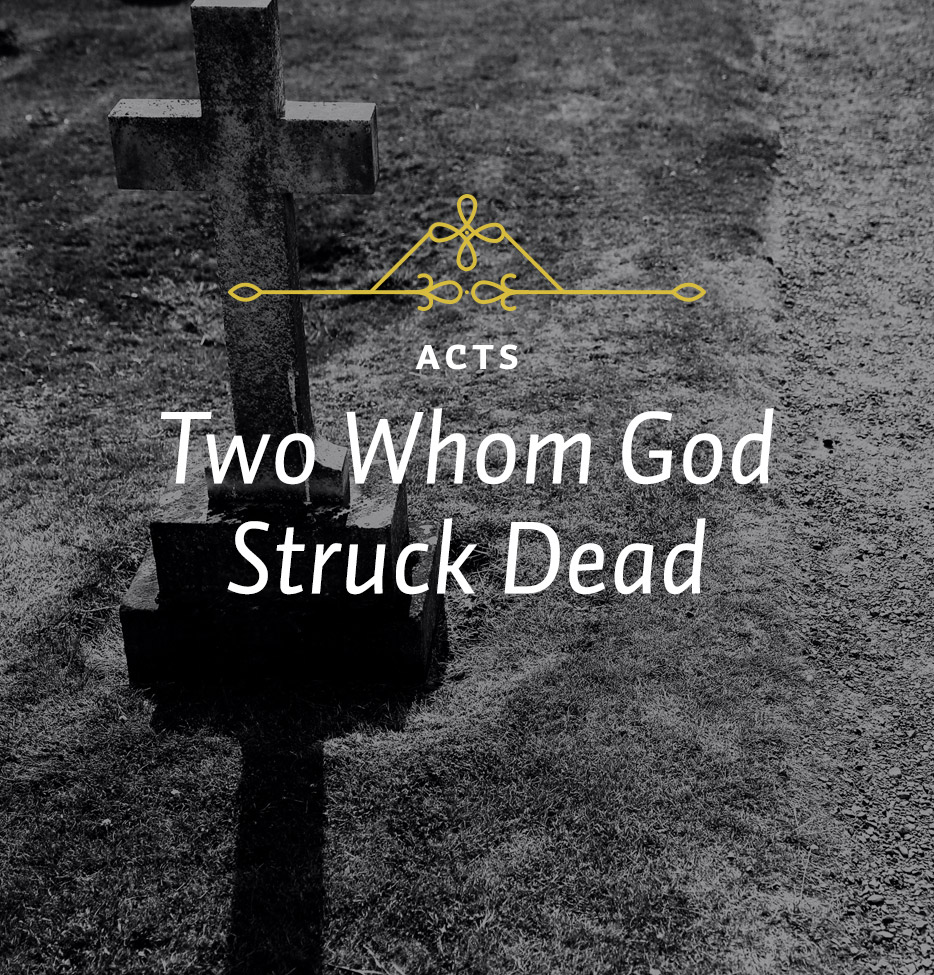Whenever I come to the story of Ananias and Sapphira, who sinned against God by lying to Him and were struck dead, I think of a sermon preached nearly thirty years ago by Donald Grey Barnhouse. It was entitled, “Men Whom God Struck Dead.” In those days, the word “man” included both men and women. Ananias and Sapphira were both embraced by that title. But the sermon covered more than this one incident. It included the Old Testament story of Nadab and Abihu, who offered improper fire upon God’s altar and were struck dead for that, and the story of Uzzah, who reached out and touched God’s ark when it was being transported to Jerusalem and was judged for that.
The sermon linked these three stories together and pointed out, quite rightly I believe, that so far as we can tell each of these individuals was “a believer.” That is, they were not in the same category as the heathen who are ignorant of God, or kings or philosophers who, in the arrogance of their unbelief, set themselves against God. These people were in the fellowship of God’s family and were all engaged in what we would call either Christian “worship” or “service.” Moreover, they were struck dead for what to us, at least, seems to be—I hate even to use the word, but let’s use it—trivial offenses.
When we put these stories together, we discover that this may explain some of the severity of the punishment—that in each instance, it was a time of important new beginnings for God’s people. Something new was being inaugurated. A new era was about to come in. It would seem that God took pains to establish at the beginning of each of these ventures that He took the purity of the relationship of the people to Himself seriously.
We cannot begin chapter 5 without looking back a few verses to the end of chapter 4. This is because there is a contrast between chapter 5, which tells of a great sin, and the earlier chapter, which speaks of a time of particularly sweet harmony in the church.
Luke did not have to give us the picture of nearly ideal harmony that he does give us in chapter 4, because, in a way, it is a repetition of what he had already recorded in chapter 2. At the end of chapter 2, after Peter’s great sermon at Pentecost and the addition of so many new believers to the church, Luke gave a picture of the early fellowship of believers that is delightful to read: “They devoted themselves to the apostles’ teaching” (that is, they were one in doctrine), “to the fellowship” (that is, they were one in heart or spirit), and “to the breaking of bread and to prayer” (that is, they took part in worshiping God together). Moreover, out of this came a generosity of spirit in which they sold what they had and distributed to anyone who was in need.
When we come to chapter 4, we find exactly the same thing. We are told that the believers were “one in heart and mind” and that they were generous: “No one claimed that any of his possessions was his own, but they shared everything they had” (v. 32). Moreover, they spent their whole time “testify[ing] to the resurrection of the Lord” (v. 33). This virtually repeats what we have already been told in chapter 2. But why is that? Luke is too fine a historian merely to be repeating himself.
Obviously, he is painting this ideal picture of church harmony as a background for the disharmony that came as a result of Ananias’ and Sapphira’s deception.
We are to see this contrast in another way as well. For not only does Luke describe what this time of sharing was about in general terms. In verse 36, he also ties it to a particular individual. The man’s name was Joseph, a Levite who came from Cyprus. We know him better as Barnabas. Luke says, “Joseph, a Levite from Cyprus, whom the apostles called Barnabas (which means Son of Encouragement), sold a field he owned and brought the money and put it at the apostles’ feet” (Acts 4:36-37).
This was an unusual time in the history of the church, of course. It is helpful to remember, because it may throw light on this time of unprecedented sharing, that Jesus had prophesied the destruction of Jerusalem. He had said that it was going to come soon and that, when His disciples saw it, they were to leave the city immediately (cf. Matt. 24:15-22). When the destruction finally did come in A. D. 70, some of the Christians remembered that and left the city. In these early days the Christians were no doubt living with thoughts of the destruction of the city in their minds, and this may be why they were so willing to sell all they had in those days. They might have thought, “The Lord has told us that Jerusalem is going to be overthrown. Our possessions are not going to do us any good then. The thing to do is sell them and use them in the Lord’s work now.” I cannot prove that this was the case. But it would explain why such exceptional giving occurred early in church history and was not repeated later.
Yet there is an application for us: Someday we are going to die, and the good we can do with our possessions will end then. Doesn’t it make sense to take care how we use our possessions, and use them well now? We should make them count. I do not say, “Sell all you have.” Normally that would be an unwise thing to do. But make sure you use your possessions for the Lord.






